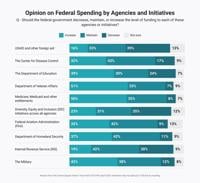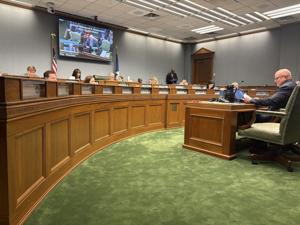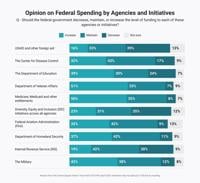(The Center Square) – American taxpayers are divided on federal spending and whether significant cuts should be made, but the vast majority support increasing or maintaining current funding levels for entitlement programs such as Medicaid and for national defense.
The Center Square’s Voters’ Voice Poll, conducted April 15-18 by Noble Predictive Insights, surveyed 1,187 Democrats; 1,089 Republicans; and 251 non-leaning Independents. The poll has a +/- 2.0% margin of error.
The majority of Americans do not want the U.S. government to increase spending on its tax collection efforts, foreign aid or DEI programs.
Of the 2,527 poll respondents, only 19% of voters back boosting funds for the Internal Revenue Service and 30% support a decrease.
Similarly, only 16% support increased funding to the United States Agency for International Development (USAID) and other foreign aid, while 39% want to cut spending on foreign aid.
USAID has come under fire for its funding of contraception, LGBTQ+ activism, electric vehicles, armed terrorist groups, and diversity, equity and inclusion (DEI) initiatives around the world. The Department of State effectively assumed control of USAID’s functions after the Trump administration slashed more than 80% of the agency’s contracts.
In general, DEI remains a fraught topic among voters, with 35% of poll respondents favoring decreasing government spending on DEI initiatives across all agencies. But 23% – mostly fueled by responses from Democrats and Independents – favor an increase, while 31% are content to keep DEI spending as is.
Medicare and Medicaid programs remain the “third rail” of American politics, with 85% of respondents supporting increasing or maintaining federal funding for the entitlement programs. Only 8% support a funding decrease, and 7% are undecided.
The U.S. military enjoys similar support, with 42% of voters supporting a funding increase and 38% content to keep military funding at current levels. Twelve percent want the roughly $850 billion budget to shrink, an unlikely scenario as Trump wants to boost defense spending to $1 trillion annually.
Voters also approve of boosting resources for those who served in the military, with 51% backing a funding increase for the Department of Veterans Affairs and 33% supporting current funding levels. Only 7% prefer a decrease and 9% are unsure.
Some targets of Trump and the Department of Government Efficiency, including the Department of Education and the Centers for Disease Control and Prevention (CDC), remain relatively popular with Americans.
Compared to 24% of voters who support funding cuts, 69% of voters support increasing or maintaining federal funding for the Department of Education, which Trump effectively dismantled in March via executive order.
The Trump administration also announced in March it will cut roughly 2,400 CDC employees and recently leaked budget plans that outline future restructuring and funding cuts. But 32% of voters polled support increasing federal spending on the CDC and 42% prefer maintaining funding levels, with 17% backing a funding cut.
The poll shows that while cutting wasteful government spending is “something Americans conceptually support,” DOGE should be “careful about the particulars,” David Byler, head of research at Noble Predictive Insights, told The Center Square.
“If it’s something where there’s an obvious government function going on, it’s a little bit harder to get the decrease there,” Byler said.
Highlighting Byler’s point, roughly 80% of voters back current or increased government spending on both the Federal Aviation Administration and the Department of Homeland Security.
The Center Square Voters’ Voice Poll is one of only six national tracking polls in the United States.













































